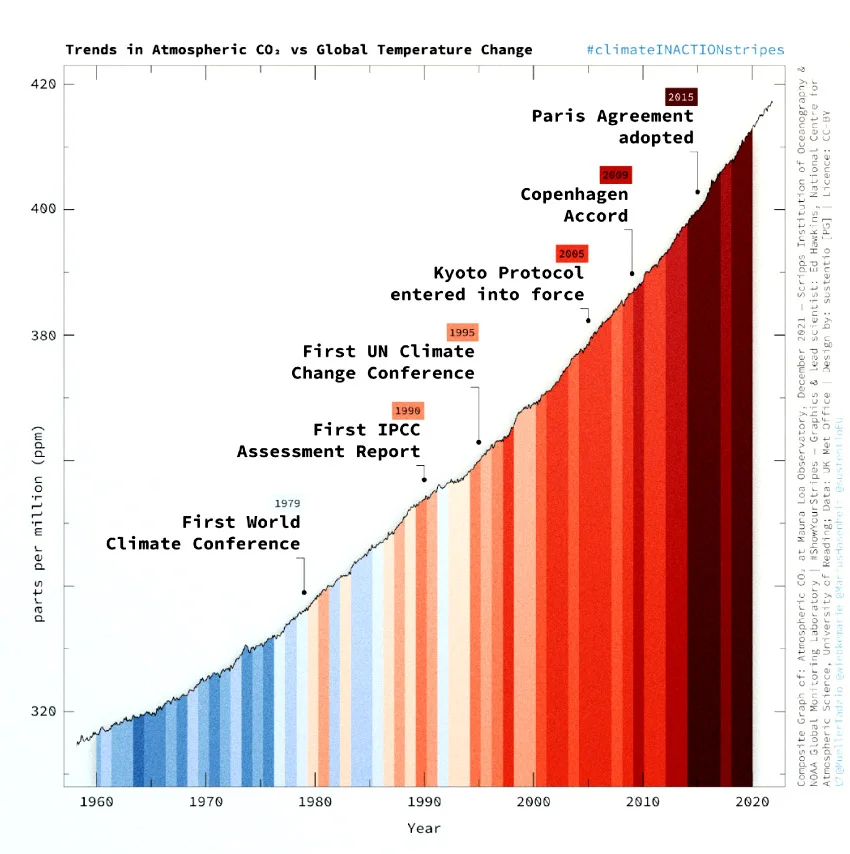
Often, when I talk to Norwegians, they are not concerned about a climate breakdown. They are looking forward to a warmer climate. Unfortunately, the expected heat will not be distributed equally, and Norway – dependent on the Gulf Stream for its relatively warm climate, may find that winters become colder, rather than hotter, as Greenland loses its ice sheet that in large part propels the global conveyor belt of ocean currents.
This post republishes a diagram showing recent increases in temperature and CO2, along with a letter from (more than) 1 447 scientists about their climate concerns.
Dear Reader,
We are a large and diverse group of scientists and academics writing to you from every continent. First, we were concerned. Then, we were alarmed. Now, we are terrified. World leaders have known about the dangers of the climate crisis for decades, but they are not acting accordingly. It is still possible to turn the tide – but we need you.
None of the climate disasters unfolding before our eyes were inevitable. In 1992, virtually all countries promised to avoid “dangerous anthropogenic interference with the climate system”. 27 global UN climate conferences (known as Conferences of the Parties, or COPs) later, carbon emissions are 60% higher than they were in 1992. Our political leaders are catastrophically failing us.
No country is taking action in line with a 1.5°C pathway, the temperature limit aspired to in the Paris Agreement. Some of the world’s richest and highest-emitting countries continue to approve new oil and gas fields, to subsidise fossil fuels with trillions of dollars every year, and to engage in destructive agricultural practices. Rich countries, which have contributed most to the climate crisis, pretend they have decades left to decarbonize, while poor countries bear the brunt of impacts without adequate compensation or help. Those who demand justice and accountability are increasingly being persecuted.
Continuing on this path will mean untold suffering. Large parts of our planet will become uninhabitable, creating hundreds of millions of refugees, unprecedented famines, and severe political conflicts.
We do not have to surrender to this future. But the window of opportunity to secure an alternative, livable future is rapidly closing. The task is enormous: the IPCC notes that “targeting a climate resilient, sustainable world involves fundamental changes to how society functions, including changes to underlying values, worldviews, ideologies, social structures, political and economic systems, and power relationships.”
These deep, structural changes can improve our quality of life. We have the prospect of less polluted environments, healthier food, and more time for the things that matter. Resources can be better distributed – both within countries and internationally – rather than accumulated by the few at the expense of the many.
The solutions are available. What is preventing adequate action is vested interests and entrenched power – institutions, corporations, and wealthy individuals who benefit from the destructive status quo. We need to rapidly phase out fossil fuels, yet COP28 is being chaired by the CEO of an oil company, illustrating the profound influence of this entrenched power.
Overcoming these vested interests requires a large-scale mobilisation of society. It has happened before: without strong social movements, there would be no civil rights, no women’s right to vote, no weekends, no holidays, nor much of the welfare that considerable parts of the world enjoy today. And it can happen again: citizens in the Netherlands recently forced their government to plan a phase-out of fossil fuel subsidies, while people in Ecuador prevented oil extraction in the Amazonian Yasuni National Park.
But we need you. Wherever you are, become a climate advocate or activist. Join or start groups pushing for policies that help secure a better future. Contact groups that are active where you are, find out when they meet and attend their meetings. Find out what kind of engagement suits you best and talk to friends, family, and colleagues to spread the word. If we are to create a livable future, climate action must move from being something that others do to something that we all do.
As scientists and academics, we believe it is now necessary to step up and engage in collective climate action. Like thousands of people around the world, many of us have been advocating and protesting for a better world in a variety of ways, including peaceful civil disobedience.
Join us.


I have been concerned with climate crisis for many decades and among other things have cut back my international travel and domestic travel by plane. In my daily life, I have cut back on buying superfluous things, such as a lot of clothing and household textiles. I am trying to wear out the clothing I do have, and make things for my home using redesign and recycling previous used items. Everyone must contribute to cutting back on habits that make the climate crisis worse. I hope others can find things that help the world survive better.
Ønsker dere alt godt. Verden og oss alle. Vi trenger det!❤🙏